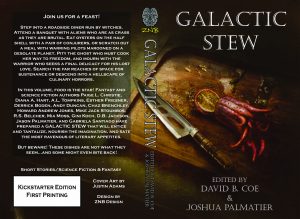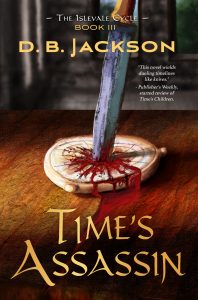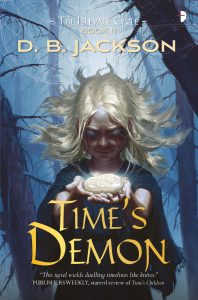I am co-editing a new Zombies Need Brains anthology with my friend, Joshua Palmatier, who is the founder and owner of Zombies Need Brains. Joshua is co-editing all three of the ZNB anthologies this year, which to my mind is totally nuts, but good for him.
The theme and title of our project for this year is DERELICT, and if you’re a writer, you should consider submitting. We are looking for stories about derelict ships (seafaring ships, space ships, even a good story about a derelict bus or truck or car could find its way into the collection). The stories should be speculative fiction (SF, fantasy, or horror) and they should be about 2,500-7,500 words long, though REALLY good stories that are shorter or a bit longer will be considered. You can find the guidelines for all three of this year’s anthologies at the ZNB website. ALWAYS read the GLs before submitting to any market.
With stories already arriving in good numbers, and the call for stories open until December 31st, I thought I would revisit some of the short fiction submission advice I offered earlier this year and late last year.
 And I’ll start with this: Joshua and I are generous readers. We will read an entire story, even when it’s pretty clear halfway in (or a quarter in…) that the story probably won’t make the cut. Your goal as a writer is to sell us a story, obviously. But really your goal is to make us consider your story on your terms. Here’s what I mean by that: We are expecting to get somewhere between 300 and 400 submissions, for a total of 6 or 7 slots. (Last year, for GALACTIC STEW, we received 409 and selected 7.) Read those sentences again; I’ll wait.
And I’ll start with this: Joshua and I are generous readers. We will read an entire story, even when it’s pretty clear halfway in (or a quarter in…) that the story probably won’t make the cut. Your goal as a writer is to sell us a story, obviously. But really your goal is to make us consider your story on your terms. Here’s what I mean by that: We are expecting to get somewhere between 300 and 400 submissions, for a total of 6 or 7 slots. (Last year, for GALACTIC STEW, we received 409 and selected 7.) Read those sentences again; I’ll wait.
We have a lot of stories to read, and while we are eager to be blown away by something really good, we are also looking for reasons to reduce our pile of submissions to be read. If you send us a manuscript that doesn’t follow the theme, or that doesn’t follow the submission guidelines, or that is filled with typos and misspellings and grammatical issues, we are probably going to reject your story and move right on to the next. That’s just fact. So, you want to get all of that stuff right, so we can consider your story solely on its merits — your terms.
Now, it may be that your story is good but not as good as others, or it might be good but too similar to others we’ve read. We’ll reject stories, even fine ones, for a number of reasons. But by getting the simple stuff right, by turning in a solid, clean, professionally presented manuscript, you give yourself a better chance.
With that in mind…
— Read and follow the guidelines. Follow the formatting to the letter. There is nothing that bothers me more than being in the middle of a 10 hour day of reading slush and getting a single-spaced manuscript that I then have to format myself. In the same way, if the GLs say the story should be no longer than 7,500 words, don’t send us something that’s 10,000. Either edit it down to the word limit or submit something else.
— Edit and polish your story. Proofread it and then proofread it AGAIN. Don’t be in such a rush to get the story out that you neglect to get rid of that typo on page 6 or three instances of “your” that should have been “you’re.” Take pride in your work. Be professional.
— Pay attention to and follow the theme. Again, we’re looking for stories about derelict ships. That doesn’t mean we want a story in which a derelict is mentioned. The ship should be the essential element of the narrative. Without the derelict, your story should fall apart. Think of it like the instructions on a cooking show: “Make our theme the star of your dish…”
— Keep in mind the basic principles of good storytelling. A successful story has conflict, emotion, tension. Characters should be impacted by what takes place. If you have trouble identifying the protagonist and antagonist of your story, it may be that you have more work to do.
— This piece of advice is one I heard Joshua give at a conference last year: Chances are your first idea won’t be your best idea. Sometimes the first idea that comes to us is the one everyone will think of. A bit more digging and thinking might produce an idea that is more original and innovative. And that may well give you a better chance of making it into the anthology. Now, I will add that now and then, the first idea IS the best. But more often than not, a bit of thought and patience will be rewarded.
— Most important, understand that a rejection from this anthology is NOT a judgment on your ability as a writer, or even on the quality of your story. Remember those numbers I gave you earlier: 300-400 submissions for 6-7 slots. Our anthology is harder to get into than Harvard. We will absolutely be rejecting outstanding stories. That’s inevitable. So don’t take it too hard. Rejections are part of being a writer. View them as a step in a longer negotiation. If your story is rejected, take ten minutes to cry over it. Have a beer or a glass of wine or a cup of hot tea. And then figure out where you’re going to send the story next.
Best of luck, and keep writing!









 As you know at this point, we are in the midst of release week for
As you know at this point, we are in the midst of release week for  The truth is, I have felt that way about all three volumes of this trilogy. The Islevale books were incredibly difficult to write. I knew going in that writing time travel would be really hard — as one friend told me, “It’ll make your brain explode.” So much can go wrong. We have to examine every plot point from every possible angle to make certain it holds up to logic, and to the simple reality that time travel gives us endless opportunities for do-overs. Put another way, every event in a time travel story is negotiable. Each one can be altered or reversed by the very plot devices on which our stories depend.
The truth is, I have felt that way about all three volumes of this trilogy. The Islevale books were incredibly difficult to write. I knew going in that writing time travel would be really hard — as one friend told me, “It’ll make your brain explode.” So much can go wrong. We have to examine every plot point from every possible angle to make certain it holds up to logic, and to the simple reality that time travel gives us endless opportunities for do-overs. Put another way, every event in a time travel story is negotiable. Each one can be altered or reversed by the very plot devices on which our stories depend. I hoped that
I hoped that  I frequently tell beginning writers that they need to self-define success, something which is really hard to do in this business. All too often we writers are forced by the nature of publishing to seek exterior affirmation for our work — reviews, sales, awards if we’re fortunate enough to win them. These are the things the industry values and so, naturally, they are the things we care about as well. The problem with this is, the industry is cruel and capricious. We all know of good, even great, books that go unnoticed and unacknowledged. We all have seen mediocrity rewarded with terrific sales and undeserved attention. And we know that this is true in the world beyond publishing as well. Life is not always fair.
I frequently tell beginning writers that they need to self-define success, something which is really hard to do in this business. All too often we writers are forced by the nature of publishing to seek exterior affirmation for our work — reviews, sales, awards if we’re fortunate enough to win them. These are the things the industry values and so, naturally, they are the things we care about as well. The problem with this is, the industry is cruel and capricious. We all know of good, even great, books that go unnoticed and unacknowledged. We all have seen mediocrity rewarded with terrific sales and undeserved attention. And we know that this is true in the world beyond publishing as well. Life is not always fair. …And allow me take a moment to urge you get a copy of Time’s Assassin. (
…And allow me take a moment to urge you get a copy of Time’s Assassin. (